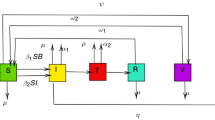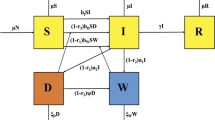Abstract
Despite the potential benefits of investments in water and sanitation, individual level water treatment remains low in many developing countries. This paper explores the dynamic relationship between water transmitted infectious disease and water treatment behavior. Using evolutionary game theory, I endogenize water treatment decisions in a mathematical model of cholera. I calibrate the model for the ’08-’09 cholera outbreak in Zimbabwe. I show that prevalence dependent water treatment behavior is a factor contributing to endemic cholera. Additionally, I find that in absence of WHO interventions in Zimbabwe, the share of the population treating their water would have converged to a level that would have enabled cholera to persist in the population.
Access this chapter
Tax calculation will be finalised at checkout
Purchases are for personal use only
Preview
Unable to display preview. Download preview PDF.
Similar content being viewed by others
References
World Health Organization: Combating waterborne disease at the household level (2007), http://www.who.int/water_sanitation_health/publications/combating_diseasepart1lowres.pdf
Dupas, P.: Health behavior in developing countries. Annual Review of Economics 3, 425–499 (2011)
Banerjee, A.V., Duflo, E.: The economic lives of the poor. Journal of Economic Perspectives 21(1), 141–168 (2007)
Geoffard, P.Y., Philipson, T.: Disease eradication: Private versus public vaccination. The American Economic Review 87(1), 222–230 (1997)
Philipson, T.: Chapter 33 economic epidemiology and infectious diseases. Handbook of Health Economics 1, 1761–1799 (2000)
Madajewicz, M., Pfaff, A., Geen, A.V., Graziano, J., Hussein, I., Momotaj, H., Sylvi, R., Ahsan, H.: Can information alone change behavior? response to arsenic contamination of groundwater in bangladesh. Journal of Development Economics 84, 731–754 (2007)
Devota, F., Duflo, E., Dupas, P., Pariente, W., Pons, V.: Happiness on tap: Piped water adoption in urban morocco. American Economic Journal: Economic Policy 4(4), 68–99 (2012)
Ashraf, N., Berry, J., Shapiro, J.M.: Can higher prices stimulate product use? evidence from a field experiment in zambia. NBER Working Paper 13247, pp. 1–55 (July 2007)
Geoffard, P.Y., Philipson, T.: Rational epidemics and their public control. International Economic Review 37(3), 603–624 (1996)
Hyman, J.M., Li, J.: Behavior changes in sis std models with selective mixing. SIAM Journal of Applied Mathematics 57(4), 1082–1094 (1997)
Klein, E., Laxminarayan, R., Smith, D.L.: Economic incentives and mathematical models of disease. Environment and Development Economics 12, 707–732 (2007)
Kremer, M.: Integrating behavioral choice into epidemiological models of aids. Quarterly Journal of Economics 111(2), 549–573 (1996)
Auld, M.C.: Choices, beliefs, and infectious disease dynamics. Journal of Health Economics 22, 361–377 (2003)
Valle, S.D., Hethcote, H., Hyman, J., Castillo-Chavez, C.: Effects of behavioral changes in a smallpox attack model. Mathematical Biosciences 195, 228–251 (2005)
Anderson, R.M., May, R.M.: Infectious Diseases of Humans: Dynamics and Control. Oxford University Press (1991)
Andrews, J.R., Basu, S.: Transmission dynamics and control of cholera in haiti: An epidemic model. Lancet 377, 1248–12455 (2011)
Mukandavire, Z., Liao, S., Wang, J., Gaff, H., Smith, D.L., Morris Jr., J.G.: Estimating the reproductive numbers for the 2008-2009 cholera outbreaks in zimbabwe. PNAS 108(21), 8767–8772 (2011)
Sandholm, W.H.: Population Games and Evolutionary Dynamics. The MIT Press (2010)
Codeco, C.T.: Endemic and epidemic dynamics of cholera: The role of the aquatic reservoir. BMC Infectious Diseases 1 (2001)
UN OCHA: Weekly situation report on cholera in zimbabwe no. 10 (January 21, 2009), http://reliefweb.int/sites/reliefweb.int/files/resources/A40A3859537F4E9385257546006E5B01-Full_Report.pdf (January 2009)
UN OCHA: Evaluation of the wash response to the 2008-2009 zimbabwe cholera epidemic and preparedness planning for future outbreaks (November 2009), https://zw.humanitarianresponse.info/document/evaluation-wash-response-2008-2009-zimbabwe-cholera-epidemic-and-preparedness-planning
Author information
Authors and Affiliations
Editor information
Editors and Affiliations
Rights and permissions
Copyright information
© 2014 Springer International Publishing Switzerland
About this paper
Cite this paper
Carpenter, A. (2014). Behavior in the Time of Cholera: Evidence from the 2008-2009 Cholera Outbreak in Zimbabwe. In: Kennedy, W.G., Agarwal, N., Yang, S.J. (eds) Social Computing, Behavioral-Cultural Modeling and Prediction. SBP 2014. Lecture Notes in Computer Science, vol 8393. Springer, Cham. https://doi.org/10.1007/978-3-319-05579-4_29
Download citation
DOI: https://doi.org/10.1007/978-3-319-05579-4_29
Publisher Name: Springer, Cham
Print ISBN: 978-3-319-05578-7
Online ISBN: 978-3-319-05579-4
eBook Packages: Computer ScienceComputer Science (R0)




